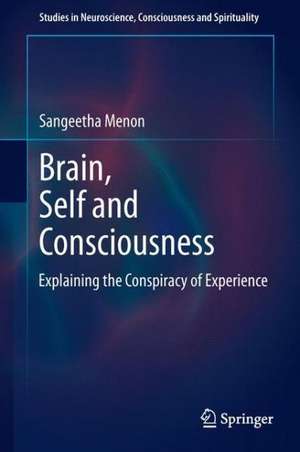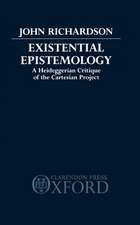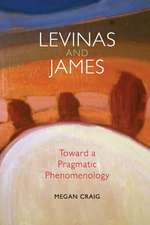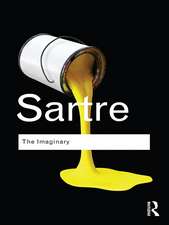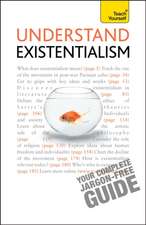Brain, Self and Consciousness: Explaining the Conspiracy of Experience: Studies in Neuroscience, Consciousness and Spirituality, cartea 3
Autor Sangeetha Menonen Limba Engleză Hardback – 6 noi 2013
| Toate formatele și edițiile | Preț | Express |
|---|---|---|
| Paperback (1) | 554.98 lei 38-45 zile | |
| Springer India – 23 aug 2016 | 554.98 lei 38-45 zile | |
| Hardback (1) | 565.64 lei 38-45 zile | |
| Springer India – 6 noi 2013 | 565.64 lei 38-45 zile |
Preț: 565.64 lei
Preț vechi: 707.05 lei
-20% Nou
Puncte Express: 848
Preț estimativ în valută:
108.24€ • 115.74$ • 90.24£
108.24€ • 115.74$ • 90.24£
Carte tipărită la comandă
Livrare economică 14-21 aprilie
Preluare comenzi: 021 569.72.76
Specificații
ISBN-13: 9788132215806
ISBN-10: 813221580X
Pagini: 214
Ilustrații: XI, 214 p.
Dimensiuni: 155 x 235 x 20 mm
Greutate: 0.5 kg
Ediția:2014
Editura: Springer India
Colecția Springer
Seria Studies in Neuroscience, Consciousness and Spirituality
Locul publicării:New Delhi, India
ISBN-10: 813221580X
Pagini: 214
Ilustrații: XI, 214 p.
Dimensiuni: 155 x 235 x 20 mm
Greutate: 0.5 kg
Ediția:2014
Editura: Springer India
Colecția Springer
Seria Studies in Neuroscience, Consciousness and Spirituality
Locul publicării:New Delhi, India
Public țintă
ResearchCuprins
Preface.- 1.Brain and Self: A Preamble.- 2.Beginnings: Biological and Philosophical Accounts of Consciousness.- 3.The Not-so-rigid Brain: Philosophical Riddles and Experiential Ironies.- 4.Body-sense and Self-Sense: Why is Minimalism Insufficient? 5.Boundaries of Self: Displacement, Meaning, and Purpose.- 6.The Feel Factor:Qualia and the Affective Markers of Experience.- 7.Beyond Brain:Final Frontiers of Consciousness.- Bibliography.- Glossary.
Recenzii
From the reviews:
“The book combines neuroscience and philosophy to get an understanding of the self and consciousness. It deals with questions such as the difference between body-sense and self-sense. … neuroscientists, philosophers, and theologians would seem to be the obvious audience. A background in neuroscience and philosophy would be extremely helpful in getting the most out of the book.” (Gary B. Kaniuk, Doody’s Book Reviews, March, 2014) Sangeetha Menon’s well-documented work is underpinned by the (too often underrated) observation that a knower is presupposed by anything known, including the known brain. It is extended to a study of agency and responsibility that gives practical ground to the challenged notion of a self. By weaving the lived and the observed into a synthetic picture of the mind-brain, the author also succeeds in making sense of the task of self-transformation, which a purely reductionist stance would just deflate into neural fitness. A very clear and exhaustive presentation of a complex yet interconnected web of topics, from the cognitive neuroscience to the analytic philosophy of mind and the Upanishads.
- Michel Bitbol, Directeur de Recherche, Archives Husserl CNRS, Paris
This is an amazingly rigorous cross-disciplinary work with a strong contention about the core-self as deep, organic, inclusive and extended beyond any reductionist or even minimal fleeting self: a great challenge for both the scientific community and the philosophical world! An urgent invitation for both to mutually look closer into the lived embodied consciousness and into the brain web!
- Natalie Depraz, Professor of Philosophy, University of Rouen
[Menon has] addressed a ‘blind spot’ in consciousness research, the ‘core self’. This was arrived at through going beyond the binary thinkingof body self and self sense. Sangeetha has presented a fascinating multi-disciplinary approach to the study of self. She penetrates deeply into the phenomenology of the body self, self sense and the core self. Most importantly, she suggests the core self to be equivalent to the space of consciousness.
- James Barrell, Professor of Psychology
and author of ‘Inner Experience and Neuroscience’, The MIT Press
This book is both interdisciplinary and cross-traditional, as Menon draws on the findings of neuroscience, psychology and cognitive science, the Western and Eastern approaches to philosophy of mind, phenomenology and the Vedantic tradition, all to address the crucial issue of the self. Menon’s main goal is to explore the self, and the self-representation, as the key to understanding consciousness. She uncovers the ways in which the self-representation depends on the body-representation, memory, emotion, character, personality, and the essential personal commitments that give our lives meaning. Whether one approaches the self from the analytic philosophy of mind, from phenomenology, or from cognitive science, this book will provide something novel, fascinating and important. It is an impressive work of impressive breadth and depth.
- Jason Ford, Associate Professor of Philosophy,
College of Liberal Arts, University of Minnesota
“The book combines neuroscience and philosophy to get an understanding of the self and consciousness. It deals with questions such as the difference between body-sense and self-sense. … neuroscientists, philosophers, and theologians would seem to be the obvious audience. A background in neuroscience and philosophy would be extremely helpful in getting the most out of the book.” (Gary B. Kaniuk, Doody’s Book Reviews, March, 2014) Sangeetha Menon’s well-documented work is underpinned by the (too often underrated) observation that a knower is presupposed by anything known, including the known brain. It is extended to a study of agency and responsibility that gives practical ground to the challenged notion of a self. By weaving the lived and the observed into a synthetic picture of the mind-brain, the author also succeeds in making sense of the task of self-transformation, which a purely reductionist stance would just deflate into neural fitness. A very clear and exhaustive presentation of a complex yet interconnected web of topics, from the cognitive neuroscience to the analytic philosophy of mind and the Upanishads.
- Michel Bitbol, Directeur de Recherche, Archives Husserl CNRS, Paris
This is an amazingly rigorous cross-disciplinary work with a strong contention about the core-self as deep, organic, inclusive and extended beyond any reductionist or even minimal fleeting self: a great challenge for both the scientific community and the philosophical world! An urgent invitation for both to mutually look closer into the lived embodied consciousness and into the brain web!
- Natalie Depraz, Professor of Philosophy, University of Rouen
[Menon has] addressed a ‘blind spot’ in consciousness research, the ‘core self’. This was arrived at through going beyond the binary thinkingof body self and self sense. Sangeetha has presented a fascinating multi-disciplinary approach to the study of self. She penetrates deeply into the phenomenology of the body self, self sense and the core self. Most importantly, she suggests the core self to be equivalent to the space of consciousness.
- James Barrell, Professor of Psychology
and author of ‘Inner Experience and Neuroscience’, The MIT Press
This book is both interdisciplinary and cross-traditional, as Menon draws on the findings of neuroscience, psychology and cognitive science, the Western and Eastern approaches to philosophy of mind, phenomenology and the Vedantic tradition, all to address the crucial issue of the self. Menon’s main goal is to explore the self, and the self-representation, as the key to understanding consciousness. She uncovers the ways in which the self-representation depends on the body-representation, memory, emotion, character, personality, and the essential personal commitments that give our lives meaning. Whether one approaches the self from the analytic philosophy of mind, from phenomenology, or from cognitive science, this book will provide something novel, fascinating and important. It is an impressive work of impressive breadth and depth.
- Jason Ford, Associate Professor of Philosophy,
College of Liberal Arts, University of Minnesota
Notă biografică
Sangeetha Menon is a professor at the National Institute of Advanced Studies (NIAS), Bangalore, India, and heads the Consciousness Studies programme of NIAS. She is a nominated member of the International Society for Science and Religion (Cambridge), a Board Member of the International Association for Transpersonal Psychology, and a Council Member of the Indian Council of Philosophical Research, Ministry of Human Resources Development, Government of India. Professor Menon has coedited Consciousness, Experience and Ways of Knowing: Perspectives from Science, Philosophy and the Arts (2006); Science and Beyond: Cosmology, Consciousness and Technology in Indic Traditions (2004); Consciousness and Genetics (2002); and Scientific and Philosophical Studies on Consciousness (1999); authored Beyond Experience: Consciousness in the Gita, and coauthored Dialogues: Philosopher Meets Seer. She has visited and spoken at many universities in India, the United States, England, Australia, Germany, France, Italy, Spain, Japan, Taiwan, Singapore, and Moscow. She has been visiting professor at the Oxford Centre for Hindu Studies, Oxford University, and at the Nanzan Institute of Religion and Culture, Nanzan University, Japan. She was invited to be a panellist at the World Parliament of Religions, Melbourne, in 2009. Apart from her academic interests, she writes poetry, fiction and is an avid photographer, artist and web-designer. She also engages in charity programmes, being a trustee of the Sambodh Foundation, Bangalore. For further details, see www.consciousnessshop.com.
Textul de pe ultima copertă
This book discusses consciousness from the perspectives of neuroscience, neuropsychiatry and philosophy.
The author argues that the central issue in brain studies is to explain the unity, continuity, and adherence of experience, whether it is sensory or mental awareness, phenomenal- or self-consciousness. The fascinating discussion that this book presents is: How do the brain and the self create the conspiracy of experience where the physicality of the brain is lost in the subjectivity of the self?
The author argues that the central issue in brain studies is to explain the unity, continuity, and adherence of experience, whether it is sensory or mental awareness, phenomenal- or self-consciousness. The fascinating discussion that this book presents is: How do the brain and the self create the conspiracy of experience where the physicality of the brain is lost in the subjectivity of the self?
Caracteristici
Argues for a focus on correlations between the self and the brain to explain facets of consciousness Delves into issues of the unity, continuity, and adherence of experience Includes perspectives from neuroscience, neuropsychology, and philosophy Includes supplementary material: sn.pub/extras
